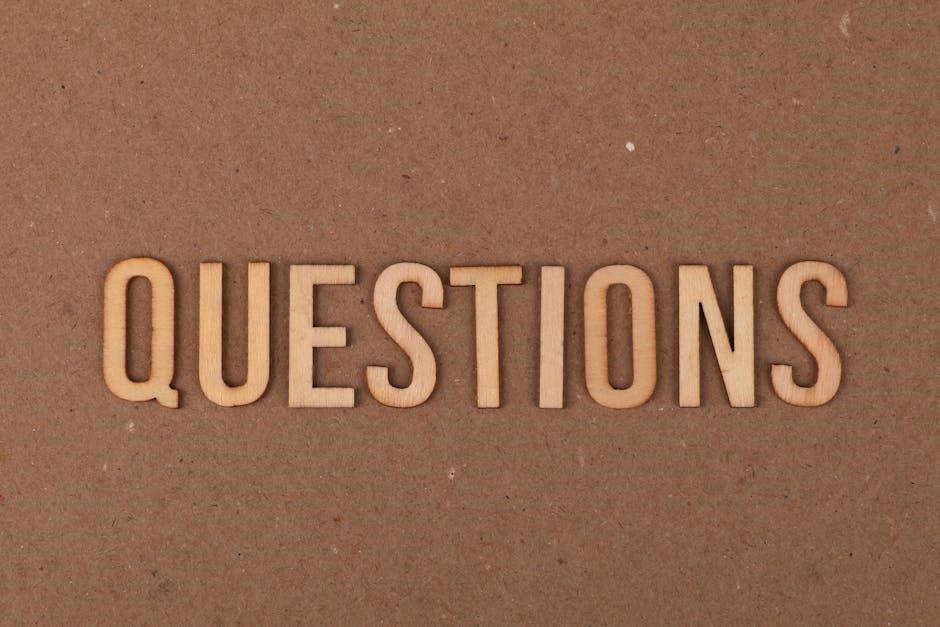Reference checks are a crucial step in verifying candidate credentials․ They provide insights into a candidate’s past performance and fit․ Sample reference check questions and answers PDF guides help employers assess skills and character effectively․
Importance of Reference Checks in Hiring
Reference checks are a critical component of the hiring process, ensuring candidates’ credentials align with their resumes․ They provide valuable insights into a candidate’s work ethic, skills, and cultural fit․ By verifying past performance, employers can reduce hiring risks and make informed decisions․ Reference checks also help identify potential red flags, such as inconsistencies or negative feedback․ A well-structured reference check process, guided by tools like a sample reference check questions and answers PDF, ensures fairness and accuracy․ This step is essential for building a reliable and high-performing team while minimizing the likelihood of a bad hire․
Overview of Sample Reference Check Questions
Sample reference check questions are designed to help employers gather detailed insights about a candidate’s past performance and suitability for a role․ These questions cover general, behavioral, and skill-specific areas, ensuring a comprehensive evaluation․ They often include inquiries about job responsibilities, teamwork, problem-solving, and career growth․ A sample reference check questions and answers PDF provides a structured framework, making it easier to compare feedback and identify patterns․ This resource ensures consistency and fairness in the hiring process, while also helping to uncover potential red flags․

Types of Reference Check Questions
Reference check questions come in various forms, including general, behavioral, skill-specific, and performance-based inquiries․ A sample reference check questions and answers PDF provides structured examples for each type․
General Reference Check Questions
General reference check questions are designed to gather foundational information about a candidate․ They typically include inquiries about the candidate’s job title, duration of employment, and relationship with the reference․ These questions help establish credibility and provide a broad overview of the candidate’s work history and character․ Examples include, “What was the candidate’s job title and responsibilities?” and “How long did you work with the candidate?” These questions set the stage for more detailed inquiries and ensure a comprehensive understanding of the candidate’s background․
Behavioral Reference Check Questions
Behavioral reference check questions focus on assessing a candidate’s past actions and experiences to predict future performance․ These questions typically ask references to describe specific situations, such as problem-solving, teamwork, or leadership scenarios․ For example, “Can you provide an example of a time when the candidate overcame a significant challenge?” or “How did the candidate handle feedback or criticism?” These inquiries help employers understand how the candidate behaves in real-world situations, offering insights into their cultural fit and work ethic․ By focusing on actionable examples, behavioral questions yield more meaningful and relevant feedback than general inquiries․
Skill-Specific Reference Check Questions
Skill-specific reference check questions aim to evaluate a candidate’s proficiency in particular areas relevant to the job․ These questions target technical abilities, problem-solving, and expertise․ For example, “Can you describe a project where the candidate demonstrated strong analytical skills?” or “How proficient is the candidate in using industry-specific software?” These inquiries help employers verify if the candidate possesses the required skills for the role․ By focusing on actionable examples, skill-specific questions provide clear insights into the candidate’s capabilities, ensuring alignment with job requirements and expectations․ This approach helps hiring teams make informed decisions․
Performance-Based Reference Check Questions
Performance-based reference check questions focus on a candidate’s achievements and how they contributed to past employers․ These questions seek specific examples of accomplishments and challenges․ For instance, “Can you share an example of a project the candidate led that improved efficiency?” or “How did the candidate handle a difficult situation?” These inquiries help employers gauge work quality and problem-solving abilities․ By requesting measurable outcomes, performance-based questions provide insights into the candidate’s ability to deliver results․ This approach ensures the candidate’s past performance aligns with the expectations of the new role, aiding in making informed hiring decisions․
Tips for Conducting Effective Reference Checks
Organize your approach by preparing a list of questions beforehand․ Ask open-ended questions to gather detailed insights․ Use a reference check template to ensure consistency and thoroughness․
Preparing for the Reference Check
Thorough preparation is essential for effective reference checks․ Start by reviewing the candidate’s resume and job description to align questions with their experience․ Use a sample reference check questions and answers PDF to create a structured guide․ Organize your questions into categories, such as general, behavioral, and skill-specific inquiries․ Ensure you have all necessary contact information for references․ Practice active listening and take detailed notes during calls․ Prepare to address potential gaps or inconsistencies in the candidate’s history․ A well-prepared approach ensures a fair and insightful evaluation, helping you make informed hiring decisions․
Asking Open-Ended Questions
Asking open-ended questions during reference checks encourages detailed and insightful responses․ Instead of yes/no questions, inquire about specific experiences, such as, “Can you describe a time when the candidate overcame a challenge?” This approach provides deeper insights into a candidate’s skills and behavior․ Use a sample reference check questions and answers PDF as a guide to craft thoughtful queries․ Open-ended questions help uncover qualitative feedback, offering a clearer picture of the candidate’s fit for the role․ They also allow references to share nuanced observations, aiding employers in making informed decisions․ This method fosters a more comprehensive understanding of the candidate’s potential․
Interpreting Responses from References
Interpreting responses from references requires careful analysis to assess a candidate’s suitability․ Look for specific examples and consistent feedback across multiple references․ Pay attention to the tone and clarity of responses, as vague or evasive answers may indicate concerns․ Use a sample reference check questions and answers PDF to guide your evaluation․ Highlight strengths and note any discrepancies or red flags, such as inconsistent timelines or negative feedback․ This process helps employers make informed hiring decisions by aligning candidate claims with verified insights from references․

Common Red Flags in Reference Checks
Red flags include inconsistencies in answers, negative feedback about work ethic, or unexplained gaps in employment history․ These issues can indicate potential problems with a candidate․
Identifying Inconsistencies in Answers
Inconsistencies in reference answers can raise concerns about a candidate’s credibility․ For example, discrepancies in employment dates, job titles, or responsibilities may indicate exaggeration or misrepresentation․ Employers should verify such details by cross-referencing with other sources․ Repeated inconsistencies could signal deeper issues, such as a lack of honesty or accountability․ Using structured reference check questions and guides helps uncover these gaps, ensuring a more accurate assessment of a candidate’s fit for the role․ Addressing these inconsistencies is crucial for making informed hiring decisions and avoiding potential risks․
Recognizing Negative Feedback
Negative feedback during reference checks can include critical comments about a candidate’s skills, behavior, or performance․ Employers should listen for specific examples, such as frequent absenteeism or difficulty working in teams․ Vague or overly general negative remarks may warrant further investigation․ It’s important to distinguish between constructive criticism and outright negativity․ Consistent negative themes across multiple references can signal red flags․ Employers should approach such feedback objectively, ensuring fairness to the candidate while prioritizing the needs of the organization․ Structured reference check guides can help identify and interpret negative feedback effectively․
Addressing Gaps in Employment History
Gaps in employment history can raise concerns about a candidate’s reliability or circumstances․ Employers should address these gaps by asking references about periods of unemployment or unexplained breaks․ Open-ended questions can help clarify the reasons behind these gaps․ References may provide insights into whether the candidate was actively seeking work or pursuing other opportunities․ Employers should listen for consistency in the candidate’s explanation and the reference’s response․ Documenting these findings can help assess the candidate’s credibility and suitability for the role․ Addressing gaps ensures a thorough understanding of the candidate’s background and potential fit for the position․
Structuring the Reference Check Process
Structuring the reference check process involves creating organized guides and templates․ These tools help standardize how references are evaluated, ensuring consistency and fairness in candidate assessment․
Developing a Structured Reference Check Guide
A structured reference check guide ensures consistency and fairness in evaluating candidates․ It typically includes an introduction, sample questions, and tips for interpreting responses․ Using a template, employers can organize questions by category, such as general, behavioral, or skill-specific inquiries․ The guide should also outline best practices, like asking open-ended questions and documenting responses․ By standardizing the process, hiring teams can make more informed decisions․ Including examples from a sample reference check questions and answers PDF adds clarity and helps users understand expected responses․ This approach streamlines the reference check process and enhances its effectiveness․
Using a Reference Check Template
A reference check template simplifies the evaluation process by providing pre-defined questions and formats․ It ensures consistency across candidate assessments and saves time․ Templates often include sections for general, behavioral, and skill-specific inquiries, along with space for notes․ Employers can adapt these templates to fit specific job requirements․ A sample reference check questions and answers PDF can serve as a helpful resource, offering examples of effective questions and expected responses․ By using a template, hiring teams can conduct thorough and fair reference checks, leading to more informed hiring decisions and better candidate fit․
Best Practices for Reference Check Interviews
Conducting effective reference check interviews requires careful preparation and a structured approach․ Employers should prepare a list of open-ended questions tailored to the role, focusing on past performance and behaviors․ Active listening and note-taking are essential to capture accurate feedback․ Maintaining a conversational tone helps references feel comfortable sharing detailed insights․ Using a sample reference check questions and answers PDF as a guide ensures consistency and thoroughness․ Following up with clarifying questions can provide deeper understanding․ Documenting responses promptly helps in making informed hiring decisions and ensures fairness in the evaluation process․

Legal Considerations in Reference Checks
Employers must ensure compliance with employment laws, protect candidate privacy, and avoid discriminatory questions․ Using a sample reference check questions and answers PDF helps maintain legal adherence․
Ensuring Compliance with Employment Laws
Conducting reference checks requires adherence to employment laws, including equal employment opportunity (EEO) regulations and the Fair Credit Reporting Act (FCRA)․ Employers must avoid discriminatory questions and ensure candidate consent․ Using a sample reference check questions and answers PDF guide helps maintain compliance by providing standardized, non-discriminatory questions․ This approach minimizes legal risks and ensures fairness in the hiring process․ Employers should also verify local and federal laws to avoid potential violations․ Staying informed and using compliant templates safeguards both organizations and candidates during reference checks․
Protecting Candidate Privacy
Protecting candidate privacy is essential during reference checks․ Employers must obtain explicit consent before contacting references and ensure transparency about the process․ Sharing only relevant, job-related information maintains trust․ Using a sample reference check questions and answers PDF guide helps employers avoid inappropriate or invasive inquiries․ Personal or sensitive information should never be disclosed without consent․ Employers must also comply with data protection laws, such as GDPR or local regulations, to safeguard candidate data․ This approach fosters a fair and respectful hiring process while ensuring confidentiality and legal compliance․
Avoiding Discriminatory Questions
Avoiding discriminatory questions is critical to ensure fairness and compliance with equal employment opportunity laws․ Employers must focus on job-related inquiries and avoid asking about race, gender, age, religion, or marital status․ Using a sample reference check questions and answers PDF guide helps maintain professionalism and avoids unintended bias․ Questions should assess skills, work ethic, and past performance․ Employers must also avoid probing into personal matters like health or family plans․ This approach ensures the process remains equitable and legally sound while protecting both the employer and candidate from potential disputes․

Sample Reference Check Questions and Answers
Explore sample reference check questions and answers PDF to gain insights into common inquiries and responses․ These guides help employers assess candidate fit and verify credentials effectively․
Example Questions for Employers
When conducting reference checks, employers often ask targeted questions to gauge a candidate’s suitability․ Examples include: “What was the candidate’s job title and duration of employment?”
“Can you describe their key responsibilities and achievements?”
“How did they handle challenges or difficult situations?”
“Would you rehire this candidate, and why?” These questions provide insights into the candidate’s skills, work ethic, and cultural fit․ Using a sample reference check questions and answers PDF ensures consistency and helps employers make informed hiring decisions․
Sample Answers from References
When providing feedback, references often highlight a candidate’s strengths, such as teamwork, problem-solving, or leadership skills․ For example, a reference might say, “They consistently met deadlines and demonstrated strong communication abilities․”
References may also discuss areas for improvement, like “They sometimes took on too many tasks, but always delivered quality work․”
These responses help employers gauge a candidate’s fit for the role․ A sample reference check questions and answers PDF often includes examples of such feedback, ensuring employers can interpret responses effectively and make informed decisions․
How to Interpret Responses
Interpreting reference responses requires analyzing content, context, and tone․ Look for specific examples and consistency in feedback․ Positive remarks on skills like teamwork or leadership indicate strengths․ Negative comments, such as difficulties with time management, should be noted but not overemphasized․ Inconsistencies across references may signal issues․ Align feedback with job requirements to assess fit․ Be aware of biases and seek objective, fact-based insights․ Balanced responses are more credible than overly positive or negative ones․ Documenting responses aids in thorough analysis and comparison․ Cultural communication styles and reference willingness to provide info are also important․ Maintain confidentiality and handle information discreetly to ensure honest feedback․ Ultimately, interpretation involves critical thinking and understanding context to make informed hiring decisions․
Creating a Comprehensive Reference Check PDF Guide
A comprehensive reference check PDF guide includes essential questions, best practices, and examples․ Organize sections logically, ensuring clarity and ease of use for hiring teams․
Including Essential Questions and Templates
A comprehensive reference check PDF guide should include essential questions tailored to assess candidate skills, behavior, and performance․ Templates such as question lists, evaluation forms, and scoring systems streamline the process․ Example questions like “How did the candidate handle challenges?” or “Can you provide examples of their teamwork?” offer clarity․ Including best practices for conducting checks and interpreting responses ensures consistency․ These tools help hiring teams gather actionable insights, making informed decisions about candidates․ A well-structured guide enhances the efficiency and effectiveness of the reference check process for all stakeholders involved․
Formatting the Guide for Clarity
A well-formatted reference check PDF guide ensures readability and ease of use․ Use clear headings and subheadings to organize content, such as question categories or evaluation criteria․ Bullet points and numbered lists make complex information digestible․ Dedicate sections for sample questions, templates, and interpretation tips․ Include white space to avoid clutter and enhance visual appeal․ Use consistent fonts and colors to maintain a professional look․ Ensure all templates and forms are easily accessible and reproducible․ A clear layout helps hiring teams navigate the guide efficiently, making the reference check process more streamlined and effective․
Sharing the Guide with Hiring Teams
Sharing the reference check guide with hiring teams ensures consistency and efficiency in the evaluation process․ Distribute the PDF guide via email or shared drives, ensuring all team members have access․ Conduct training sessions to familiarize the team with the guide’s structure and best practices․ Encourage feedback to refine the guide over time․ Make sure the guide is easily searchable and accessible, with clear sections for quick reference․ By standardizing the process, hiring teams can conduct reference checks more effectively, ensuring fairness and accuracy in candidate assessments․

No Responses